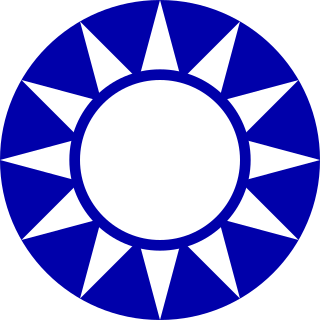 W
WThe Kuomintang (KMT), also known as the Chinese Nationalist Party, is a political party in the Republic of China (Taiwan) and the largest opposition party in the Legislative Yuan. In Taiwanese politics, the KMT primarily competes with the rival Democratic Progressive Party. The KMT opposes de jure Taiwan independence and Chinese unification under "One Country, Two Systems", instead favoring cross-strait relations with the People's Republic of China (PRC) and maintaining Taiwan's status quo under the Constitution of the Republic of China. The current chairman is Johnny Chiang. The Kuomintang is among the two major historical contemporary parties in China, the other being the Chinese Communist Party (CCP).
 W
WThe 2019 Kuomintang presidential primary was held after 22 May 2019 through a series of nationwide opinion polls in order to determine its nominee for the President of the Republic of China in the 2020 presidential election.
 W
WThe Blue Shirts Society (藍衣社), also known as the Society of Practice of the Three Principles of the People, the Spirit Encouragement Society and the China Reconstruction Society, was a secret ultranationalist faction that modeled Italian fascists in the Kuomintang.
 W
WThe Blue Sky with a White Sun serves as the design for the party flag and emblem of the Kuomintang (KMT), the canton of the flag of the Republic of China, the national emblem of the Republic of China, and as the naval jack of the ROC Navy.
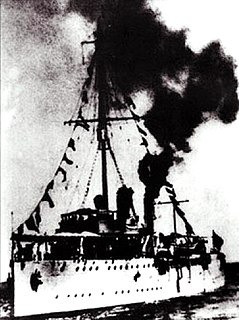 W
WThe Canton Coup of 20 March 1926, also known as the Zhongshan Incident or the March 20th Incident, was a purge of Communist elements of the Nationalist army in Guangzhou undertaken by Chiang Kai-shek. The incident solidified Chiang's power immediately before the successful Northern Expedition, turning him into the paramount leader of the country.
 W
WChina Daily News is a traditional Chinese-language newspaper published in Tainan, Taiwan. It was first established on 20 February 1946 by the Kuomintang and first published on 28 March 1946. The newspaper focuses on the Tainan area. In 1949 a Taipei edition was founded.
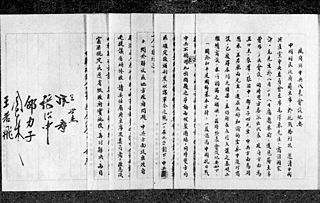 W
WThe Double Tenth Agreement, formally known as the Summary of Conversations Between the Government and the Representatives of the Chinese Communist Party, was an agreement between the Kuomintang (KMT) and the Chinese Communist Party (CCP) that was concluded on 10 October 1945 after 43 days of negotiations. CCP Chairman Mao Zedong and United States Ambassador to China Patrick J. Hurley flew together to Chungking on 27 August 1945 to begin the negotiations. The outcome was that the CCP acknowledged the KMT as the legitimate government, while the KMT in return recognised the CCP as a legitimate opposition party. The Shangdang Campaign, which began on 10 September, came to an end on 12 October as a result of the announcement of the agreement.
 W
WThe February 28 incident, also rendered as the February 28 massacre, the 228 incident, or the 228 massacre, was an anti-government uprising in Taiwan that was violently suppressed by governor Chen Yi of the Kuomintang-led Republic of China government, which killed thousands of civilians beginning on February 28, 1947. The number of Taiwanese deaths from the incident and massacre was estimated to be between 18,000 and 28,000. The massacre marked the beginning of the White Terror, in which tens of thousands of other Taiwanese went missing, died, or were imprisoned. The incident is one of the most important events in Taiwan's modern history and was a critical impetus for the Taiwan independence movement.
 W
WFushun War Criminals Management Centre, also known as Liaodong No. 3 Prison or Liaoning No. 3 Prison, was the site of the re-education of Manchukuo, Kuomintang and Japanese prisoners of war, held by China from 1950 onwards. It was located in the Xinfu District, Fushun, Liaoning. Among the inmates were Puyi, the last emperor of China and former puppet emperor of Manchukuo, his younger brother Pujie and several other important World War II figures such as Xi Qia, Zang Shiyi and Zhang Jinghui. Part of the prison site currently remains in use, but the older section has been turned into a museum depicting the history of Fushun war criminals management centre and the life of the people who worked or were interned there.
 W
WThe History of the Kuomintang is an overview on the inception of the Kuomintang (KMT), a Chinese political party that ruled mainland China from 1927 to 1949 prior to its relocation to Taiwan as a result of the Chinese Civil War. The name of the party translates as "China's National People's Party" and was historically referred to as the Chinese Nationalists. The Party was initially founded on 23 August 1912, by Sun Yat-sen but dissolved in November 1913. It reformed on October 10th 1919, again led by Sun Yat-sen, and became the ruling party in China. After Sun's death, the party was dominated from 1927 to 1975 by Chiang Kai-shek. Though the KMT lost the civil war with the Communist Party of China in 1949, the party took control of Taiwan and remains a major political party of the Republic of China based in Taiwan.
 W
WThe Ill-gotten Party Assets Settlement Committee is an independent government agency of the Republic of China established in 2016. It is responsible for the investigation and returning of ill-gotten assets of political parties and their affiliated organizations during the martial law period in Taiwan. All parties established before the lifting of martial law, 15 July 1987, are required to report their party assets to the committee. As the dominant party during the martial law period, the Kuomintang (KMT) and its affiliate organizations are the main targets of this investigation. The council is headquartered in Zhongshan District, Taipei.
 W
WThe Kuomintang Islamic insurgency refers to a continuation of the Chinese Civil War by Chinese Muslim nationalist Kuomintang Republic of China Army forces in Northwest China, in the provinces of Gansu, Qinghai, Ningxia, and Xinjiang, and another insurgency in Yunnan.
 W
WThe July 15 Incident, known by the Communist Party of China (CPC) as the July 15 counter-revolutionary coup, and as the Wuhan–Communist split by the Kuomintang (KMT), occurred on 15 July 1927. Following growing strains in the coalition between the KMT government in Wuhan and the CPC, and under pressure from the rival nationalist government led by Chiang Kai-shek in Nanjing, Wuhan leader Wang Jingwei ordered a purge of communists from his government in July 1927.
 W
WThe Korean Liberation Army, established on September 17, 1940 in Chungking, China, was the armed force of the Provisional Government of the Republic of Korea. Its commandant was General Ji Cheong-cheon, with General Lee Beom-seok, a hero of the Battle of Cheongsanri and future prime minister of South Korea as the Chief of Staff. Effectively part of the Chinese forces upon which it was dependent, the army was limited by available manpower and did not get much above 339 strong. The KLA became the basis of the modern Republic of Korea Armed Forces.
 W
WThe Kuomintang in Burma (KMT) were Chinese Nationalist troops that fled from China to Burma in 1950 after their defeat by the Communists in the Chinese Civil War. Officially the "Yunnan Anti-communist National Salvation Army", the KMT troops in Burma were commanded by General Li Mi. It attempted several incursions into Yunnan in the early 1950s, only to be pushed back into Burma each time by the Chinese Communist Party's People's Liberation Army.
 W
WThe Kuomintang Youth League, also known as Young KMT, is a youth group under the Kuomintang. The Kuomintang Youth League was created in 2006 by Kuomintang chairman Ma Ying-jeou to help promote cultural and political awareness among Chinese youths. The Kuomintang Youth League now has numerous chapters spread throughout the sovereign lands of the Republic of China (Taiwan) and its extensive overseas network include many cities in the United States.
 W
W W
WA military dependents' village is a community in Taiwan built in the late 1940s and the 1950s whose original purpose was to serve as provisional housing for soldiers, sailors, airmen and marines of the Republic of China Armed Forces, along with their dependents from mainland China after the Government of the Republic of China (ROC) and the Kuomintang (KMT) retreated to Taiwan in 1949. They ended up becoming permanent settlements, forming distinct cultures as enclaves of mainlanders in Taiwanese cities. Over the years, many military dependents' villages have suffered from urban problems such as housing dereliction, abandonment, urban decay, and urban slum.
 W
WThe National Revolutionary Army, sometimes shortened to Revolutionary Army (革命軍) before 1928, and as National Army (國軍) after 1928, was the military arm of the Kuomintang from 1925 until 1947 in the Republic of China. It also became the regular army of the ROC during the KMT's period of party rule beginning in 1928. It was renamed the Republic of China Armed Forces after the 1947 Constitution, which instituted civilian control of the military.
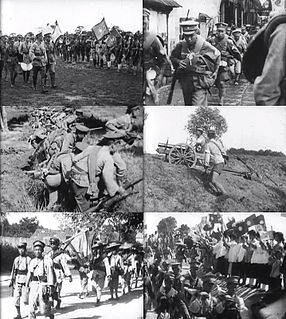 W
WThe Northern Expedition was a military campaign launched by the National Revolutionary Army (NRA) of the Kuomintang (KMT), also known as the "Chinese Nationalist Party", against the Beiyang government and other regional warlords in 1926. The purpose of the campaign was to reunify China, which had become fragmented in the aftermath of the Revolution of 1911. The expedition was led by Generalissimo Chiang Kai-shek, and was divided into two phases. The first phase ended in a 1927 political split between two factions of the KMT: the right-leaning Nanjing faction, led by Chiang, and the left-leaning faction in Wuhan, led by Wang Jingwei. The split was partially motivated by Chiang's purging of communists within the KMT, which marked the end of the First United Front. In an effort to mend this schism, Chiang Kai-shek stepped down as the commander of the NRA in August 1927, and went into exile in Japan.
 W
WPropaganda in China refers to the use of propaganda by the Chinese Communist Party (CCP) or (historically) the Kuomintang (KMT) to sway domestic and international opinion in favor of its policies. Domestically, this includes censorship of proscribed views and an active promotion of views that favor the government. Propaganda is considered central to the operation of the CCP government. The term xuanchuan can have either a neutral connotation in official government contexts or a pejorative connotation in informal contexts. Some xuanchuan collocations usually refer to "propaganda", others to "publicity", and still others are ambiguous.
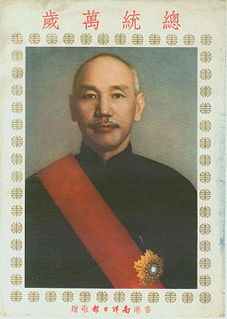 W
WPropaganda has been an important tool of the Republic of China's government since its inception in 1912. The term xuanchuan can have either a neutral connotation in official government contexts or a pejorative connotation in informal contexts. Some xuanchuan collocations usually refer to "propaganda", others to "publicity", and still others are ambiguous. It also was an important tool in legitimizing the Kuomintang controlled Republic of China government that retreated from Mainland China to Taiwan in 1949.
 W
WThe retreat of the Government of the Republic of China to Taiwan, also known as the Kuomintang's retreat to Taiwan, or "The Great Retreat", refers to the exodus of the remnants of the internationally recognized Kuomintang-ruled government of the Republic of China (ROC) to the island of Taiwan (Formosa) in December 1949 toward the end of active battles in the Chinese Civil War. The Kuomintang, its officers, and approximately 2 million ROC troops took part in the retreat, in addition to many civilians and refugees, fleeing the advance of the Chinese Communist People's Liberation Army.
 W
WThe Hsing Chung Hui, translated as the Revive China Society (興中會), the Society for Regenerating China, or the Proper China Society was founded by Sun Yat-sen on 24 November 1894 to forward the goal of establishing prosperity for China and as a platform for future revolutionary activities. It was formed during the First Sino-Japanese War, after a string of Chinese military defeats exposed corruption and incompetence within the imperial government of the Qing dynasty. The Revive China Society went through several political re-organizations in later years and eventually became the party known as the Kuomintang. As such, the contemporary Kuomintang considers its founding date to be the establishment of Revive China Society.
 W
WThe Revolutionary Committee of the Chinese Kuomintang (RCCK) is one of the eight legally recognised minor political parties in the People's Republic of China that follow the direction of the Communist Party of China (CPC). It was founded in January 1948, during the height of the Chinese Civil War, by members of the left wing of the Kuomintang (KMT), especially those who were against Chiang Kai-shek's policies. The first Chairman of the party was General Li Jishen, a senior Nationalist military commander who had many disputes with Chiang over the years, while Soong Ching-ling was named Honorary Chairwoman. Other early leading members were Wang Kunlun, Cheng Qian, He Xiangning and Tao Zhiyue. The party claims to be the true heir of Sun Yat-sen's legacy and his Three Principles of the People. By the end of 2017, it had 131,410 members.
 W
WThe village of Santikhiri, formerly known as Mae Salong, is in the Thai highlands on Doi Mae Salong mountain of the Daen Lao Range, in Mae Fa Luang District, Chiang Rai Province, the northernmost province of Thailand. The area has an alpine-like landscape and climate, and is known for its hill tribe villages, tea plantations, and cherry blossoms.
 W
WThe Western Hills Group was a faction of the Chinese Nationalist Party, or KMT, active in the 1920s. The faction was formed at a meeting of KMT leaders opposed to communist influence held at Biyun Temple in the Western Hills district of Beijing in November 1925. About half the KMT leadership attended the meeting. The group included Lin Sen, Ju Zheng, Zou Lu, and Xie Chi. In the three-way struggle for party leadership that followed the death of Sun Yat-sen, the group supported Hu Hanmin against leftist Wang Jingwei and centrist Chiang Kai-shek. Hu was Sun's intended successor, but he did not identify with the group.